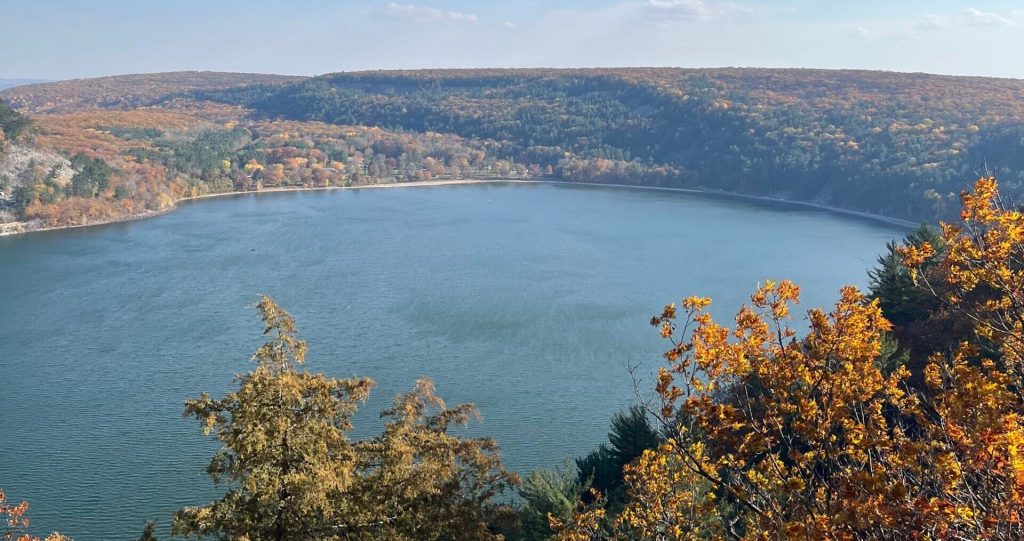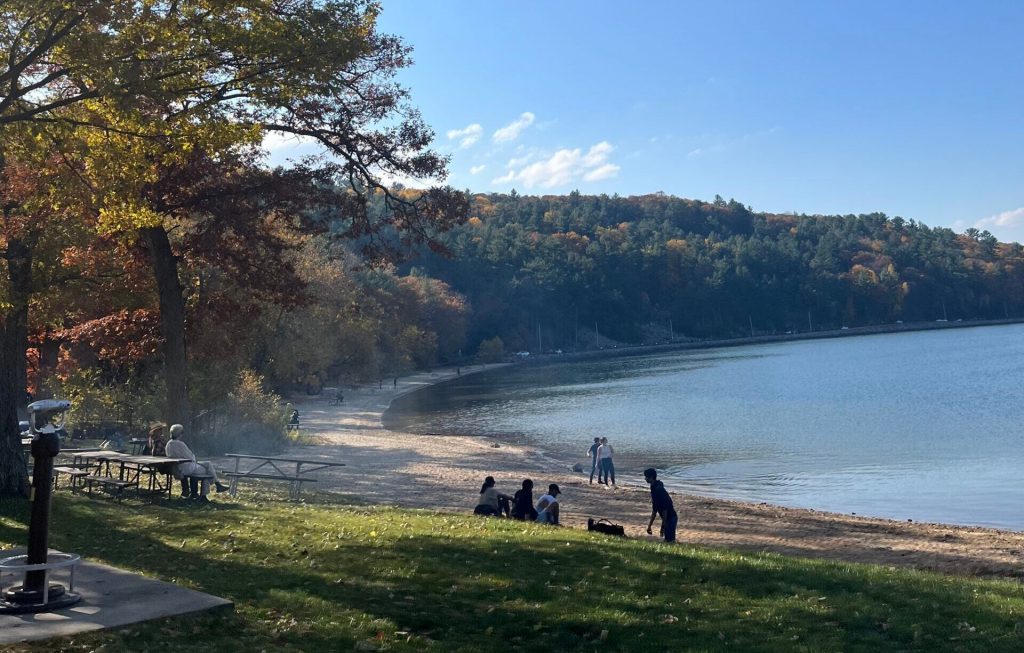Should Lakes and Forests Have Rights in Wisconsin? Bills Propose Protections
A group of Democrats is proposing 'rights of nature' legislation

Fall leaves change color around the lake at Devil’s Lake State Park in November 2022. Alyssa Allemand/WPR
A group of Democratic state lawmakers say natural features like lakes and forests should be given their own legal standing.
They unveiled what’s known as “rights to nature” legislation during a news conference scheduled to coincide with Indigenous People’s Day.
In Wisconsin, the Ho-Chunk Nation included a right-of-nature provision in its tribal constitution and the Menominee Nation has also adopted legislation recognizing the rights of the Menominee River.
One of the proposals announced Monday seeks to protect Devil’s Lake State Park, specifically, while the other is a more general resolution encouraging the state to affirm the rights of all natural resources in the state.
That resolution also calls on local governments to adopt their own rights of nature principle — which is a direct rebuke to a bill introduced by Republicans last month.
The new GOP bill would stop local governments from introducing such ordinances. The bill’s sponsors say those local laws could undermine the country’s founding legal principles, which recognize the rights of people.
And they say they could lead to a “dangerous shift” in legal precedent by “threatening property rights, stalling development, and burdening the judicial system,” state Rep. Joy Goeben, R-Hobart, and state Sen. Steve Nass, R-Whitewater, wrote in a co-sponsorship memo.
That means the Democrat-backed bills face a difficult road in the Republican-controlled state Legislature.
Anahkwet, who also goes by Guy Reiter, is an activist and member of the Menominee Nation. He spoke in favor of the proposals on Monday, while flanked by legislative sponsors including Rep. Vincent Miresse, D-Stevens Point, Angelito Tenorio, D- West Allis, and state Rep. Ryan Clancy, D-Milwaukee.
“Nature is not property. It’s our relative,” Anahkwet said. “You cannot poison the water without poisoning our children. You cannot clear cut the forest without cutting down our future.”
One bill would set fines specifically for harming Devil’s Lake State Park
One of the bills would set a $1,000 fine for any business or government entity that’s found to have infringed on the rights of Devil’s Lake State Park to “flourish, regenerate, and evolve.” That includes the park’s right to clean water and to “full restoration, recovery and preservation.” The bill also says any entity found to have damaged the park could be liable for additional damages in the amount needed to restore the park to its former condition.
Devil’s Lake, known as Tee Wakącąk in the Ho-Chunk language, is Wisconsin’s most-visited state park. The park in Baraboo includes rock bluffs that overlook the 360-acre lake.
A fiscal estimate has not yet been attached to the draft bill, but the proposal also stipulates that Wisconsin’s Department of Natural Resources would need to complete an environmental study of Devil’s Lake State Park to identify damaged ecosystems or species. After that, the department would have five years to complete a “full restoration” of the park.
Another proposal would restore restrictions on hard rock mining
The last piece of the legislative package would restore restrictions on hard rock mining. That’s the practice of extracting nickel, gold and copper from sulfide ore.
Under the proposal, which sponsors refer to as a “prove it first” bill, the DNR would only be allowed to grant a permit for sulfide mining if a company submits proof of its prior environmental record.
“Today, we are looking to recommit (to) the legacy of protecting Wisconsin’s lakes, rivers, drinking water,” Tenorio said. “Clean water is Wisconsin’s greatest resource, alongside our people, alongside our air alongside our land.”
The bill mirrors a 1997 Wisconsin law, which was signed by Republican then-Gov. Tommy Thompson. A decade later, in 2017, Republican lawmakers repealed the law, citing a desire to boost economic growth. Republican then-Gov. Scott Walker signed the repeal of the 1997 requirements.
Should lakes and forests have rights in Wisconsin? Bills seek natural resource protections. was originally published by Wisconsin Public Radio.
If you think stories like this are important, become a member of Urban Milwaukee and help support real, independent journalism. Plus you get some cool added benefits.





















